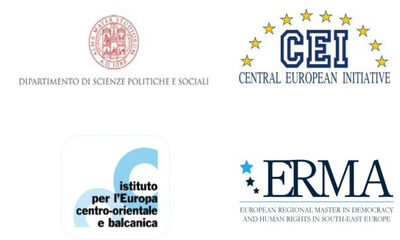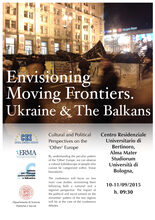and Balkan Europe
by IECOB & AIS Università di Bologna

This area offers a wide range of continuously updated news regarding both academic and cultural events together with academic calls and study programs
Envisioning Moving Frontiers. Ukraine & The Balkans

Venue: Centro Residenziale Universitario di Bertinoro, Alma Mater Studiorum Università di Bologna
Period: 10-11/09/2015
Program
"Drawing boundaries" is an exercise of power. Boundaries can be geographical, social, cultural, or economic. They define "what belongs to us" and "what does not". By using the term ‘frontier’, in order to define “an intermediate zone of contact between two or more distinctive cultures or polites”, A. J. Rieber looks at the peculiar historical creation of multiple frontiers between states, empires and civilizations, especially focusing on the shifting Eurasian boundaries. In the South-East European area, the prolonged existence of the multicultural empires postponed, according to Rieber, the passage from the historical frontiers to the language-ethnic (national) ones. By understanding the peculiar pattern of the 'Other' Europe, we can observe a cultural kaleidoscope of people who cannot be categorized within 'linear boundaries’. Nowadays, in the light of the dramatic events occurring in the Russo-Ukrainian frontier, the ‘Other’ Europe is experiencing a new wave of political and social turmoil. One of the questions we would like to explore is how the Balkans look at Ukraine.

From newly independent Kosovo to Bosnia-Herzegovina, are people watching events in Ukraine through the lenses of their personal experience of the Yugoslav collapse? Some support Euromaidan for taking down a corrupt regime; others lament the potential economic fallout. Once more we can observe how these political, social and cultural boundaries are characterized by fluid and blurred dynamics. The second strand of enquiry to be explored concerns the impact of these dynamic changes on the status of minorities in these regions, as well as the negotiations of belonging between political, cultural and linguistic categories.
The conference will focus on two main case studies, envisioning them following both a national and a regional perspective. The impact of the political and social turmoil on the minorities’ pattern of the two regions will be at the core of the conference debates.
The participants
Maria Grazia Bartolini is Assistant Professor of Ukrainian Literature and Medieval Slavic Studies at Milan University, from which she holds a PhD in Slavic Literatures. She was 2013 Shklar Fellow at the Harvard Ukrainian Research Institute. Together with Alessandro Achilli and Marco Puleri, she is co-editor of Minima Ucrainica
Nina Y. Belayeva is a Professor and the head of the Public Policy Department ,that she has created in 2000 in National Research University Higher School of Economics, Moscow, and frequent visiting fellow at University of Bologna, Italy, where she recently started Double Degree Master Program between HSE and UniBo in the field of International Public Policy and Global Governance. Prof. Belyaeva's major research interests are within the field of comparative citizen participation in different political regimes, competing actors in creating regulatory regimes, think tanks and knowledge governance and interaction between "knowledge communities" and self-organized publics and their influence on Global Governance.
Giovanna Brogi was Professor of Slavic Studies (Medieval Eastern Slavic and Ukrainian literature) at the University of Milan until November 2014. From 1993 to 1998 she was co-Vice-President of the International Association of Slavic Studies. Since 2001 Giovanna Brogi has been President of the Italian Association of Ukrainian Studies. She received a laurea honoris causa at the Ivan Franko University of L’viv and the Kyivan Mohyla University. Her main research interests concern Historiography of Renaissance and Baroque in the Slavic countries and in the European tradition, Baroque literature of Ukraine with comparative approach to Western European and Russian literature, Plurilinguism and multiculturalism in Ukraine (16th-18th century), History of Slavic studies.
Rozita Dimova is Associate Professor in South East European Studies (2013-) at Ghent University, Belgium. Her main research interests concern borders, materiality, gender, ethno-nationalism, aesthetics, performance, art, refugees. Her latest publications include: (2014) Between borderlines, betwixt citizenship: Gender, agency and the crisis in the Macedonia/Greece border region (Women's Studies International Forum, 2014, In Press, available online 19 August 2014).
Mychailo Glubokyi works at Izolyatsia Foundation (Donec’k, Ukraine). Izolyatsia is a multidisciplinary cultural centre founded in 2010 on the territory of a former insulation factory in Donetsk, Ukraine. Izolyatsia inherits its name from this factory. The name reflects the foundation’s mission: to preserve the industrial heritage whilst simultaneously engaging with alternative programmes of social and cultural development. During the past five years, Izolyatsia has delivered more than thirty large-scale projects and numerous educational and social initiatives.
Yarina Grusha is cultural projects coordinator in Ukrainian Crisis Media Center, Kyiv. Graduated from Kyiv Taras Shevchenko University in 2008, faculty of Italian language and literature, dedicating her diploma paper to Memory Discourse in Umberto Eco’s novels. Since 2009 Ms Grusha has been working in cultural sphere. She was the coordinator of different film sections at Molodist IFF and Odessa IFF. Ms. Grusha was among founders of Babylon'13 cinema of a civil protest. During the last year she dedicated herself to cultural journalism and cultural events in the frame of the projects Cultural Diplomacy between Ukrainian regions.
Dušan Svetolik Janjić is Principal Research Fellow at the Centre for Sociological Research, Institute of Social Sciences, University of Belgrade, Serbia, President of the Board of the Forum for Ethnic Relations, Belgrade, Serbia and President of the political party “Active Serbia”, Belgrade, Serbia. Specialised in Sociology of (Ethno) Nationalism; Ethnicity; Ethnic Conflicts and their Resolution; Human and Minorities Rights; Political Movements and Ideologies; Peace Making and Building.
Dejan Jović is Professor of International Relations at the Faculty of Political Sciences at the University of Zagreb, where he is the head of the Department for International Politics and Diplomacy. He finished his PhD at the London School of Economics and Political Sciences (LSE, 1999), and afterwards he continued his work at the European University Institute in Florence (EUI, 2000) and Stirling University in Scotland (2000-2010). He is the author of the book Yugoslavia: A State That Withered Away (2003, the American edition in 2009), the editor of the books Slobodan Milošević: Road to Power (alongside Momčilo Pavlović and Vladimir Petrović, 2008), Theories of International Relations: Realism (2013) and Liberal Theories of International Relations(2014). From 2010 until 2014 he was Head
Analyst for the President of the Republic of Croatia and since 2013 he has been Head Editor of the academic journal Croatian Political Science Review.
Stanislav Menzelevskyi – film critic and curator, Head of Research and Programming Department at Oleksandr Dovzhenko National Center (Kyiv). Postgraduate student at the Cultural Studies Department (National University of “Kyiv-Mohyla Akademy”). Carnegie Fellow at The Harriman Institute (Columbia University, NYC, Fall 2013). Member of Editorial Board of Medusa publishing house. Contributor to Commons, Prostory, Political Critique magazines.
Mikhail Minakov is a scholar, political analyst and consultant. He has taught at the Kyiv-Mohyla Academy since 2001. He has held fellowships at Harvard University, the Wodroow Wilson Centre for International Scholars (Fulbright Kennan Scholar in 2012-2013), and at Krupp Wisseschaftskolleg, Greifswald. In 2011, Dr. Minakov became the founding Editor-in-Chief of the scholarly peer-reviewed journal “Ideology and Politics.” He combines his academic career with work in political consulting. In 2010, he co-founded the Foundation for Good Politics and has been working with politicians and officials from the USA, Germany, Ukraine and Russia. He has also worked at the Eurasia Foundation, the Open Society Institute in Budapest, Soros Foundation in Ukraine, Victor Pinchuk Foundation, and UNDP in Ukraine.
Elvira Mujčić, born in Serbia in 1980, is an Italian-Bosnian writer. She has lived in Bosnia until the outbreak of the war in 1992. Graduated in foreign languages and literatures, lives and works in Rome. She has published: Al di là del Caos (2007), E se Fuad avesse avuto la dinamite (2009), Sarajevo: la storia di un piccolo tradimento (2011), La lingua di Ana (2012).
Asim Mujkić graduated from the Faculty of Philosophy, University of Sarajevo (Department of Philosophy and Sociology). He acts currently as professor at the Faculty of Political Sciences, University of Sarajevo, and the Vice Dean for Academic Affairs. He has published five books and more than 80 scientific papers in various journals and proceedings at home and abroad.
Aleksej Nikitin is a Ukrainian Russian-language writer. He was born in Kiev, Ukraine, USSR, in 1967. He studied physics at Kiev University and spent time in the army after which he worked in the gas and nuclear industries – including devising an emergency system for suppression dust contamination from the Chernobyl sarcophagus. He published many novels and novellas. In 2000 Nikitin won the Ukrainian Writers Union Korolenko Prize for the year’s best work of fiction in Russian and in 2014 he was awarded the Russian Prize for his novel Victory Park.
Elena Stjazhkina is professor of history at Donec’k National University (Ukraine). She is well known as a scholar and a writer in both Ukraine and Russia. Recently, she published her ‘Diaries’, entitled ‘Country. War. Love’, where she tells the dramatic events which took place in her hometown during the last year.
Organizer and Partners
CEI – Central European Initiative
Founded in 1989, the CEI is a regional intergovernmental forum committed to supporting European integration through cooperation among its Member States. It combines multilateral diplomacy and project management, both as donor and recipient, while bridging European macro-regions.
During the days of the conference, we will be glad to host Amb. Giovanni Caracciolo di Vietri and Sen. Lodovico Sonego.
IECOB – Istituto per l’Europa Centro-Orientale e Balcanica
IECOB was founded in 1995 by scholars from different European and American Universities connected through the “Europe and the Balkans International Network”. Since then, IECOB has been active in promoting a yearly Summer School, MA Programmes and vocational courses. The Institute also cooperates with the Alma Mater-University of Bologna and the University of Sarajevo in organising interdisciplinary postgraduate courses.
Information & contacts
Alma Mater Studiorum University of Bologna
Dipartimento di Scienze Politiche e Sociali
address: Strada Maggiore 45, 40125, Bologna
Prof. Stefano Bianchini
e-mail: unibo.eurobalk@unibo.it
Dr. Marco Puleri
e-mail: marco.puleri2@unibo.it
Dr. Sanja Kajinić
e-mail: sanja.kajinic@unibo.it


 Download the info in PDF format
Download the info in PDF format





